Find out how to hard boil eggs perfectly every single time, with a creamy yolk and beautiful egg white... and also for how long to boil a hard boiled egg. No kidding! These hard boiled eggs are super-easy to peel and only take 10 minutes to cook. Awesome, right? As easy to prepare as our Sunny Side Up Eggs, Breakfast Egg Cups, and this How to Make an Omelette Easy recipes.
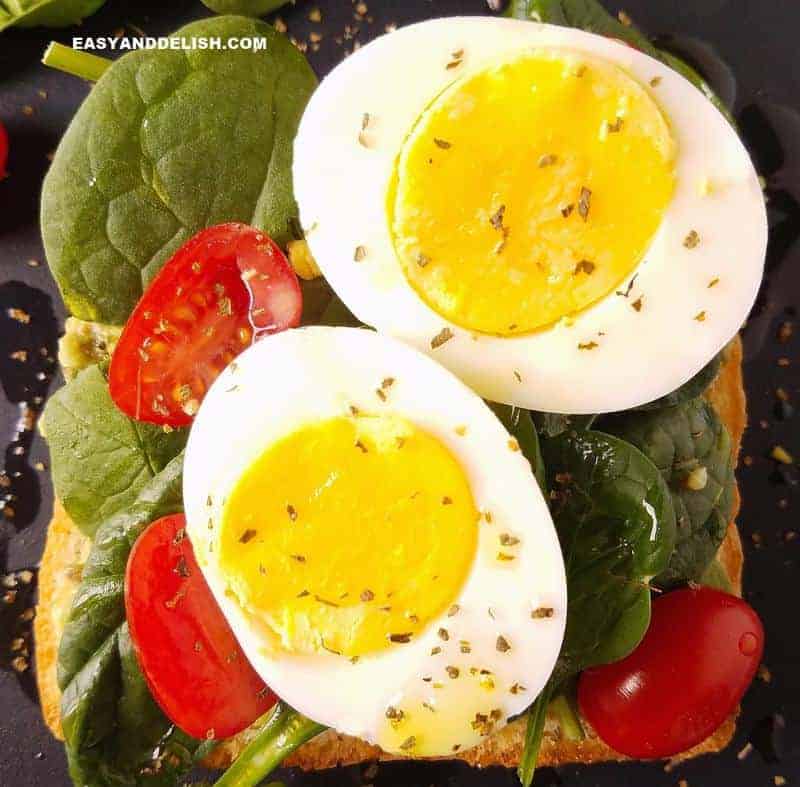
Who is up for the best hard boiled egg recipe ever? In case you didn’t know, there is more than one way to make boiled eggs. In fact, here you will find a complete, easy guide showing 3 ways how to cook hard boil eggs on the stovetop. By using one of them, you’ll be able to make not only hard boiled eggs, but also medium-cooked and soft-boiled eggs.
Imagine that… all 3 methods in a single place to make your life a breeze and help you get you an affordable, healthy breakfast ready in no time. We are sharing the best way to hard boil eggs, folks!
Just be aware that besides the stovetop you can also boil eggs in the microwave, in a steamer, in the oven, in a slow cooker, and in an Instant Pot. How cool! Just choose the way that fits your lifestyle best!
Here comes the fun part, get your eggs, and dye them for Easter.
Out of all the options, I still find the stovetop method to be efficient and the one that doesn’t require any extra investment in a cooking gadget. Just pick up a pan, fill it with water, and cook the darn eggs. Easy peasy!
By following our tips you can get the best results at home: perfectly cooked hard boiled eggs – in contrast to some other places you may have visited. If you’ve ever gone to a breakfast eatery or hotel buffet and were disgusted with overcooked eggs (rubbery texture and green ring around the yolk), you are not alone! It can spoil the first meal of the day big time.
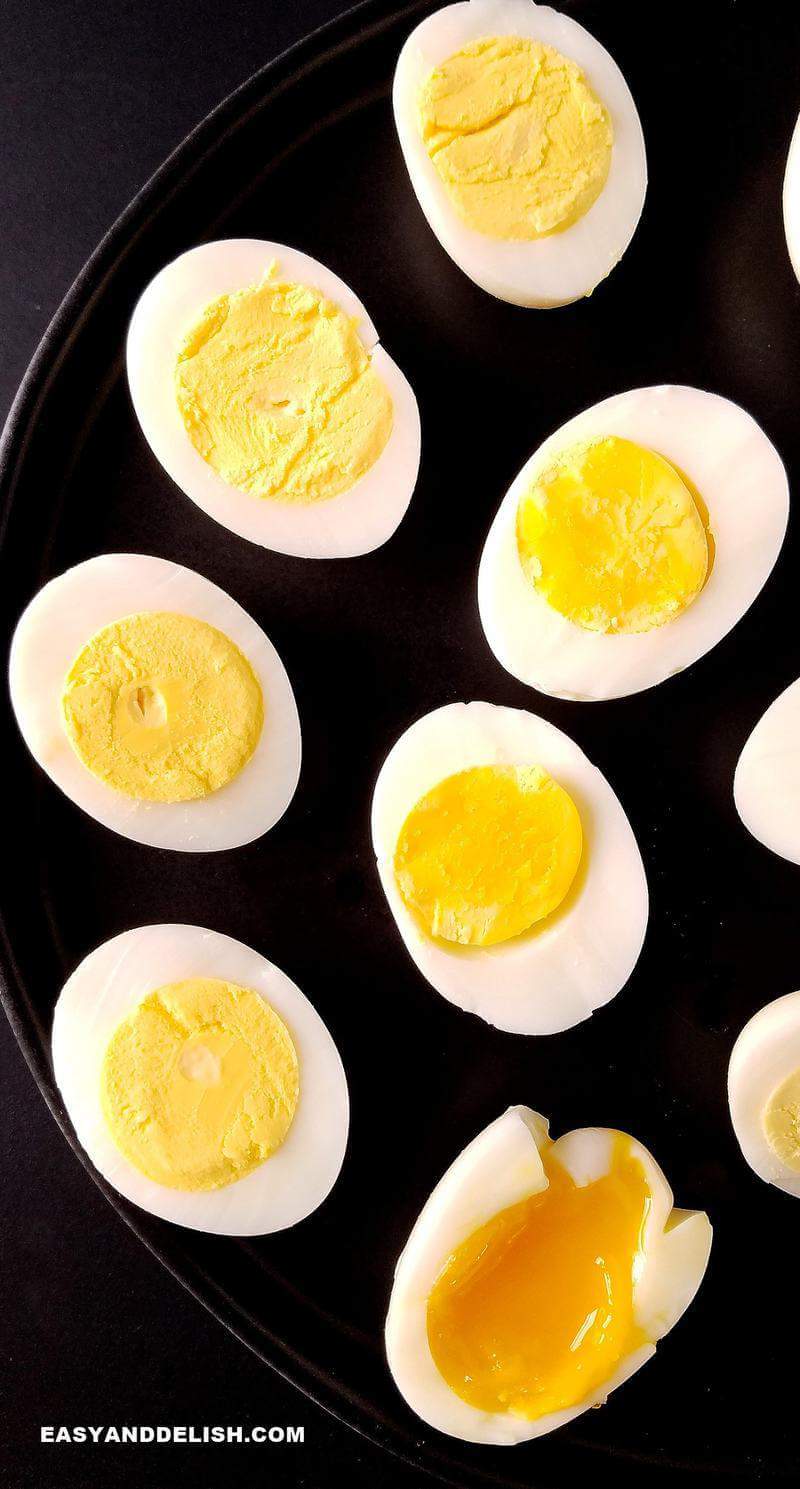
But the thing is, you don’t have to repeat that fiasco at home, wasting time and money. Indeed, perfect hard-boiled eggs have no green ring around the yolk, and instead... the yolk is yellow, creamy, and mellow. The whites are set, yet soft to the bite-- not rubbery!
But you know what? If you prefer a jammy yolk, you can easily cook the eggs for a shorter time instead.
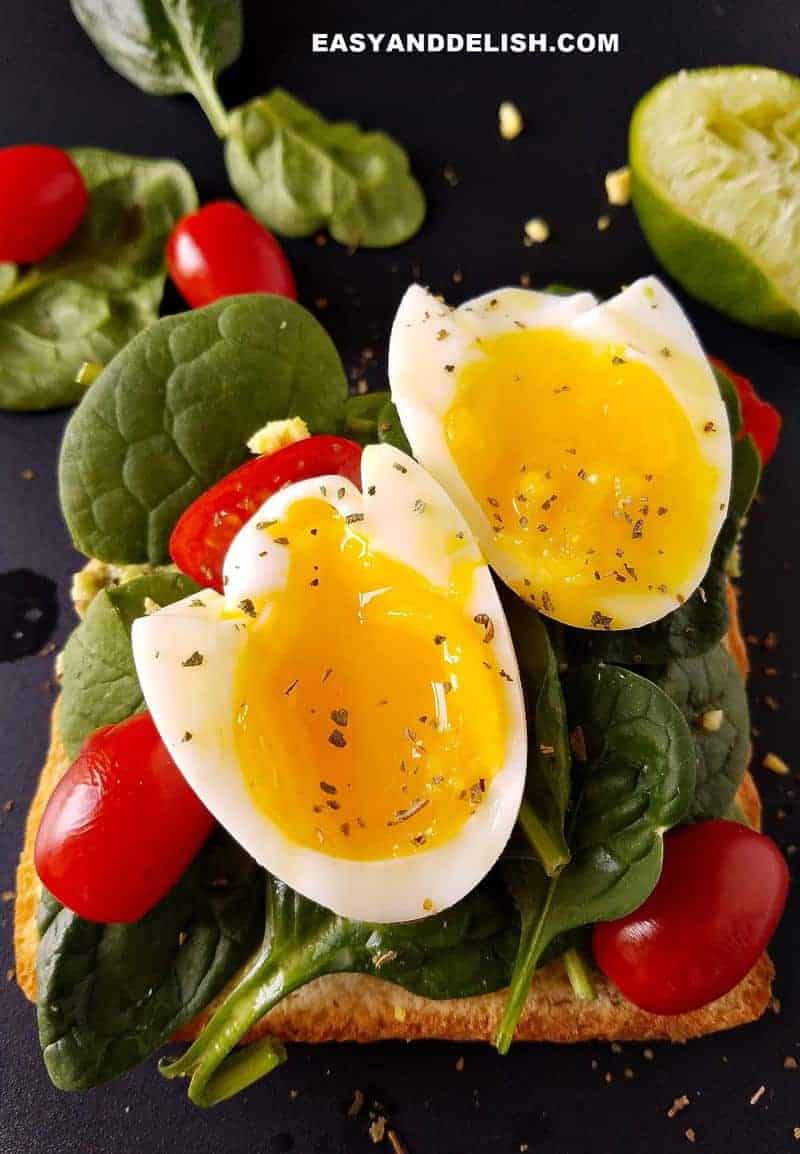
Table of Contents
- 1 How to boil eggs
- 2 How to make perfect hard boiled eggs
- 3 How long to boil eggs
- 4 How long do hard boiled eggs last refrigerated?
- 5 Can hard boiled eggs be frozen?
- 6 How to hard boil eggs (3 ways)
- 7 The Perfect Hard-Boiled Eggs Should Have:
- 8 How Fresh Are Your Eggs?
- 9 Easy to peel boiled eggs
- 10 How to prevent your eggs from cracking
- 11 Easter Eggs
- 12 Other Egg Recipes To Try·
- 13 How to Hard Boil Eggs Properly
How to boil eggs
There is no question about it! Hard-boiled eggs should be quick & easy to cook. You can make them ahead or simply prepare them right before having breakfast. In either case, it shouldn’t be a hassle!
The time needed to make boiled eggs depends on 2 factors:
- How hard or soft of a yolk is desired. It can take from 3 to 15 minutes on the stovetop;
- It also depends on which of the 3 stovetop methods you choose.
Rest assured that all of them are foolproof! Yes, these are the best boiled eggs that you'll ever have.
They will result in delish, creamy yolks, and set whites. You’ll never have to guess how to avoid rubbery white or greenish rings around the yolk ever again.
After all, boiled eggs are one of the most versatile and affordable sources of protein. You can have them for breakfast, a snack, lunch, appetizer, or dinner, or prepare different dishes with them. That’s how important they are!
They are a healthy and cheap source of protein and we teach how to meal prep them and other foods for the week.
The image below for a hard boiled egg belongs to Christina Vlahoulis and is used with her permission!
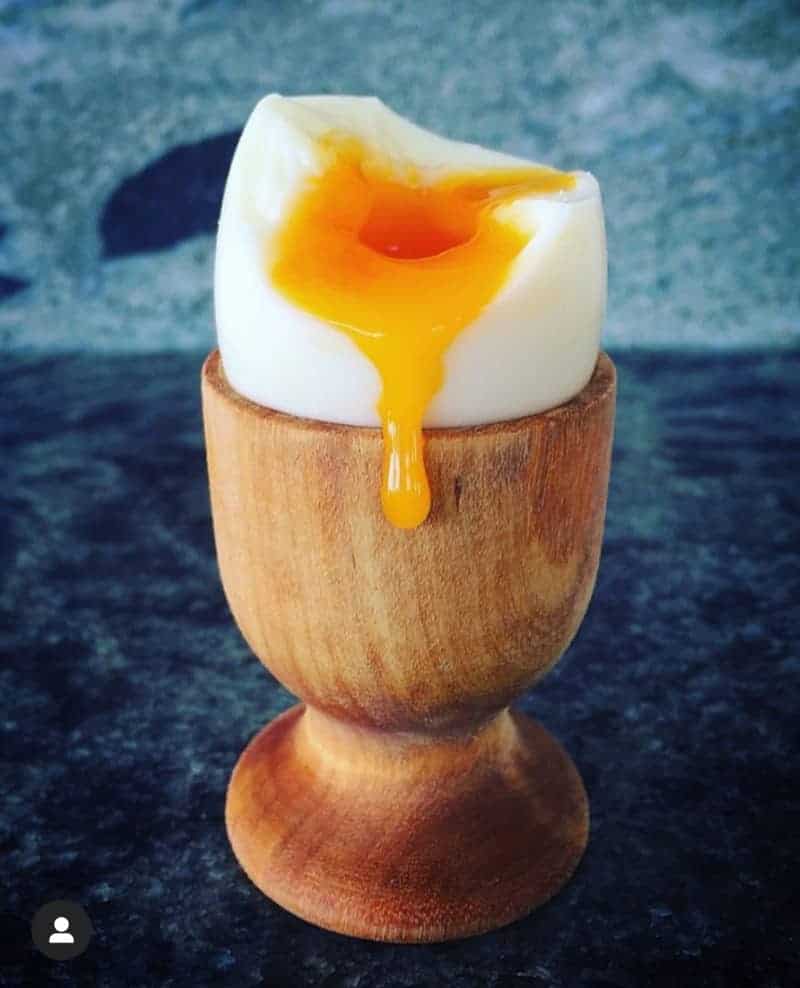
How to make perfect hard boiled eggs
Wondering the best way to cook hard boiled eggs perfectly every time? Well, guess no more! Here is what you need:
Ingredients
- 6 large eggs, straight from the fridge
- Cold, running water
- Ice
Equipment
- Saucepan
- Timer
- Slotted spoon
- Bowl
How long to boil eggs
Wondering the best way to boil eggs as well as for how long to boil a hard boiled egg? It depends on which method that you choose but it usually takes:
- Soft-boiled or jammy eggs: 3-4 minutes
- Medium-boiled eggs: 5-7 minutes
- Hard-boiled eggs: 10-12 minutes
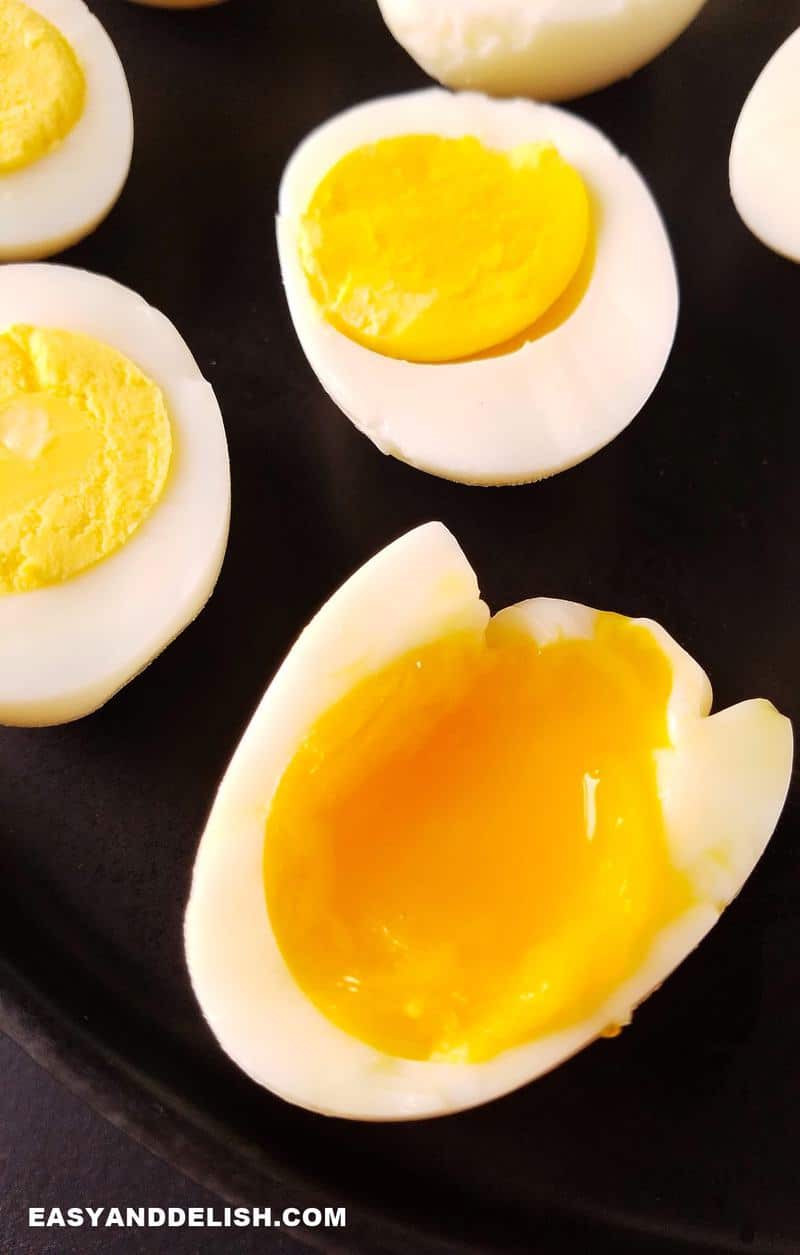
How long do hard boiled eggs last refrigerated?
Let eggs cool completely and then refrigerate them for up to 1 week-- either in their shell or peeled in a sealed container or plastic bag.
Can hard boiled eggs be frozen?
Unfortunately NO! Hard boiled eggs are not part of the arsenal of easy freezer meals -- although you can make them ahead and refrigerate. Freezing them alters the overall texture, making them quite unpleasant to the bite.
How to hard boil eggs (3 ways)
To start off, the term “hard-boiled eggs” refers to shelled eggs boiled in water until they reach a soft-, medium-, or hard-cooked stage according to the following methods.
METHOD 1 (COLD EGGS, BOILED COVERED – FAST METHOD):
- Boil eggs recipe: Place them in a large saucepan. Cover them with cool water by 1 to 2 inches.
- Cover the pot with a lid and bring water to a boil over high heat.
- As soon as the water reaches a full rolling boil, set the timer for the desired time.
- Soft-boiled eggs, cook for 2-3 minutes
- Medium-boiled eggs, cook eggs for 5-6 minutes
- Hard-boiled eggs, cook for 7-8 minutes
- Using a slotted spoon, transfer cooked eggs to a large bowl with ice cold water and let them sit for 2-3 minutes. Roll eggs on the counter to crack and then peel under running water.
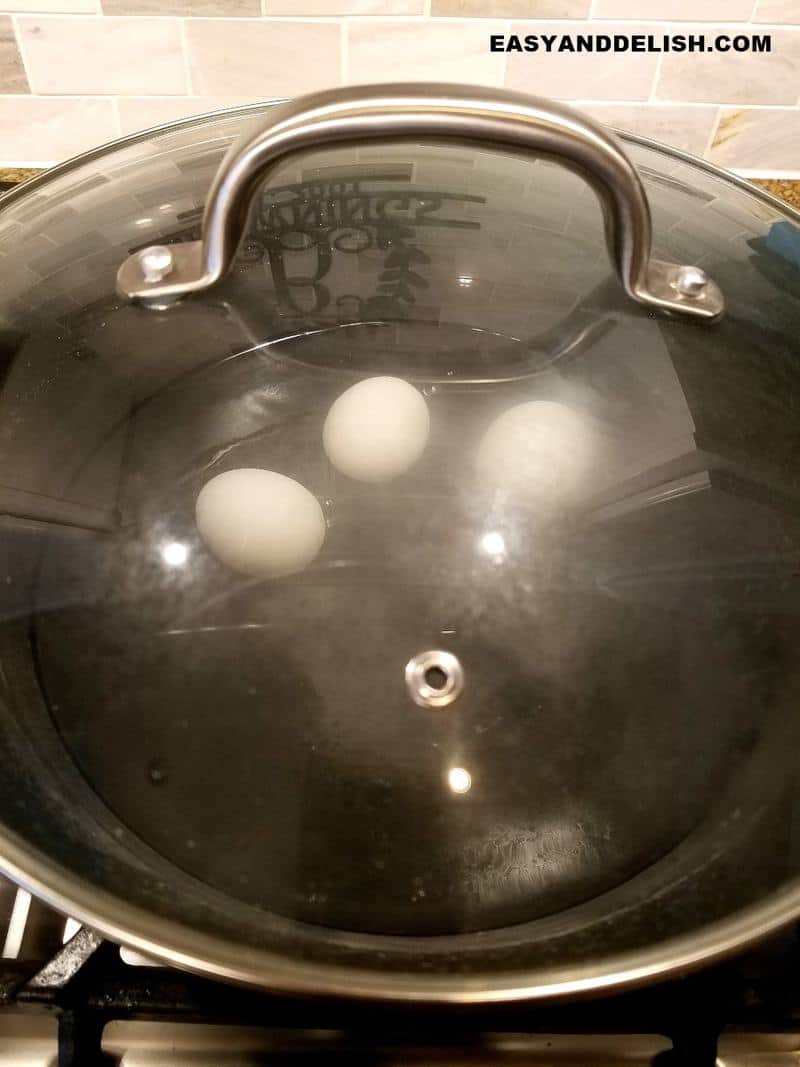
METHOD 2 (COLD EGGS, BOIL FIRST, AND THEN COVER) – My favorite method!
This is my favorite method because: 1) the risk of overcooking them is less than the previous method and 2) it doesn’t take very much longer to cook compared to that method. The overall difference is just a couple of minutes.
- Place (2 weeks or older) eggs in a saucepan and then cover them with cold water by 1 inch. Stir in 1 teaspoon of vinegar (PIC.1).
- Bring water to a boil over high heat (PIC.2).
- As soon as it comes to a full rolling boil, remove the pan from heat and cover it with a lid.
- Let stand off the heat for 3-4 minutes (soft boiled eggs), 5-7 minutes (medium-boiled eggs), or for 10-12 minutes (hard-boiled eggs). If you are a stickler for avoiding overcooking, then cook eggs for the minimum time stated within those ranges.
- Drain and transfer eggs to a large bowl with ice-cold water and let them sit for up to 1 minute (PIC.3). Roll eggs on the counter (or shake them very well in a closed jar) to crack and then peel under running water (PIC.4).
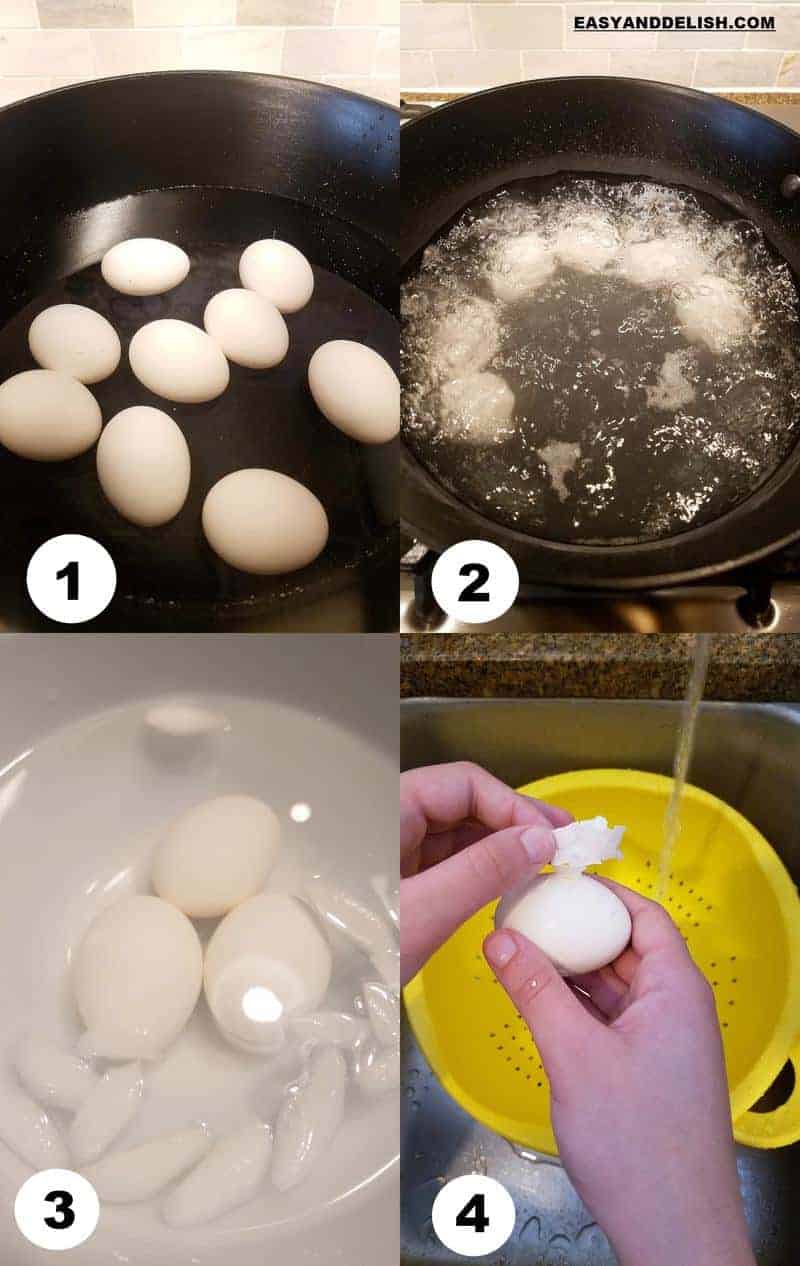
METHOD 3 (ROOM TEMP EGGS, BOIL, AND THEN SIMMER):
- Bring eggs to room temperature by placing them in a bowl of warm water for 5 minutes, or by letting them sit out of the fridge for 1 hour before cooking. If you don’t let them come to room temp, they will crack!
- Meanwhile, boil water over high heat. Then, using a slotted spoon gently place them in the boiling water. Reduce heat to medium-low and let the water come to a simmer.
- Simmer (do not boil) for the required time: Soft cooked: 3-4 minutes / Medium cooked: 5-7 minutes / Hard cooked: 12-15 minutes.
- Cool in an ice water bath to stop the cooking. Crack the shell by rolling on the counter and peel under running water to help loosen the shell.
NOTE: Exact cooking time depends on the temperature of eggs, the size of eggs, and the amount of water used.
The Perfect Hard-Boiled Eggs Should Have:
- Evenly coagulated whites and yolks.
- Whites glossy and firm but tender (not tough or rubbery).
- Yolks must be creamy and yellow (no greenish ring around the yolk).
- Pleasing flavor.
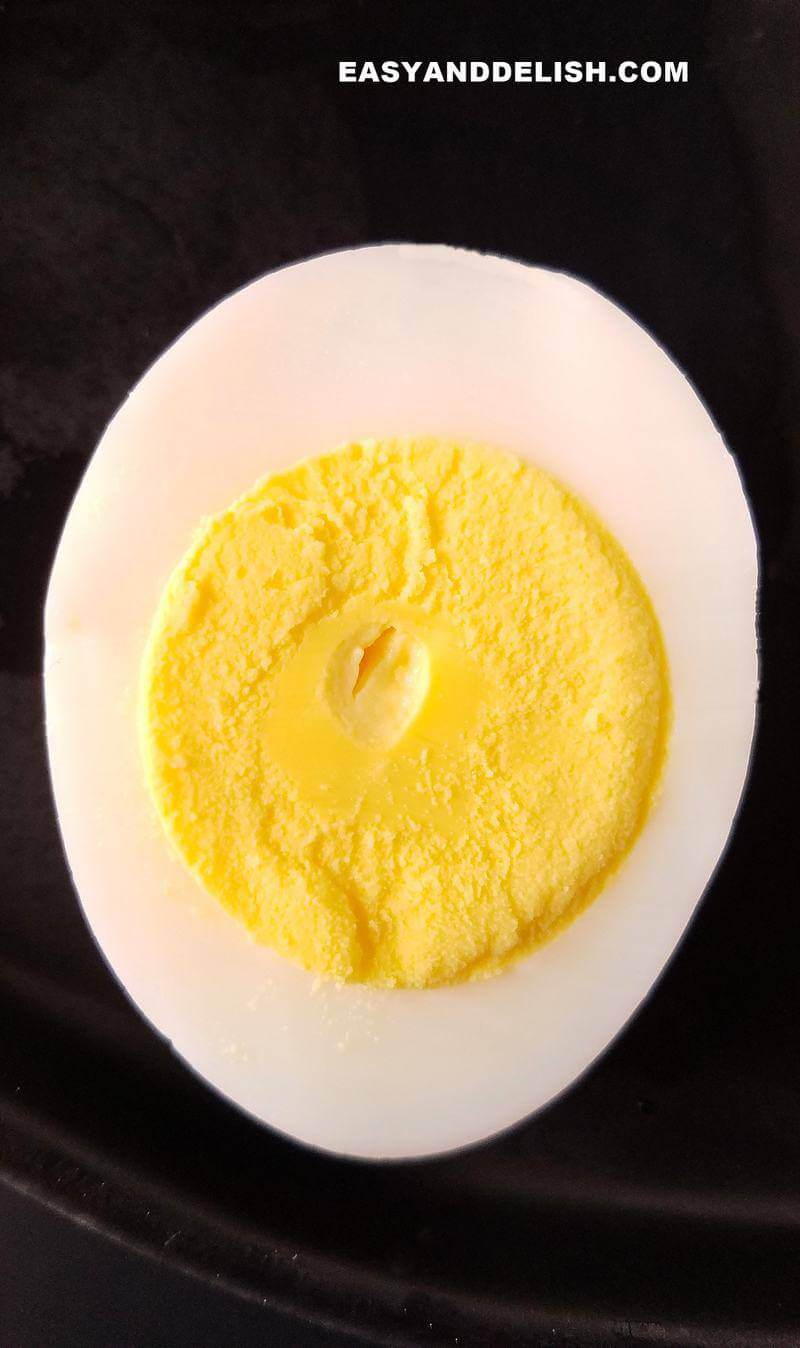
How Fresh Are Your Eggs?
Would you like to do a quick test before boiling eggs? You can find out if they have expired or are still good enough to cook with.
To do this, place an egg in a cup of water and look for the following signs:
- If the egg sinks (lying on its side), it is fresh! It is great to eat but hard to peel. Fresh eggs have a brighter yellow yolk when cooked.
- If the egg sinks but stays upright on one end, it is an older egg that is still good to eat. It will be easy to peel!
- If the egg floats, it’s an expired egg. Don’t eat it!
Easy to peel boiled eggs
Peeling eggs doesn’t have to be a hard task! To keep the egg white intact when peeling, use one of the tips below:
- Use older eggs (1-2 weeks or older). What this means is fresh eggs will be hard to peel because they contain a thin membrane under the shell!
- Add either ½ teaspoon salt or baking soda to the water to make them even easier to peel. The baking soda particularly increases the alkalinity of the water, making it easy to peel eggs.
- Add vinegar to the water, which serves a double purpose: not only does it help prevent eggs from cracking but also softens the shell, making it easier to peel. I add it every time that I cook them!
- Roll cooked eggs on the counter. After cooking and cooling them in a bowl of ice cold water, roll eggs on the counter to crack them all around. Then either places them under running water or soak them in water to loosen the shell and peel it easily.
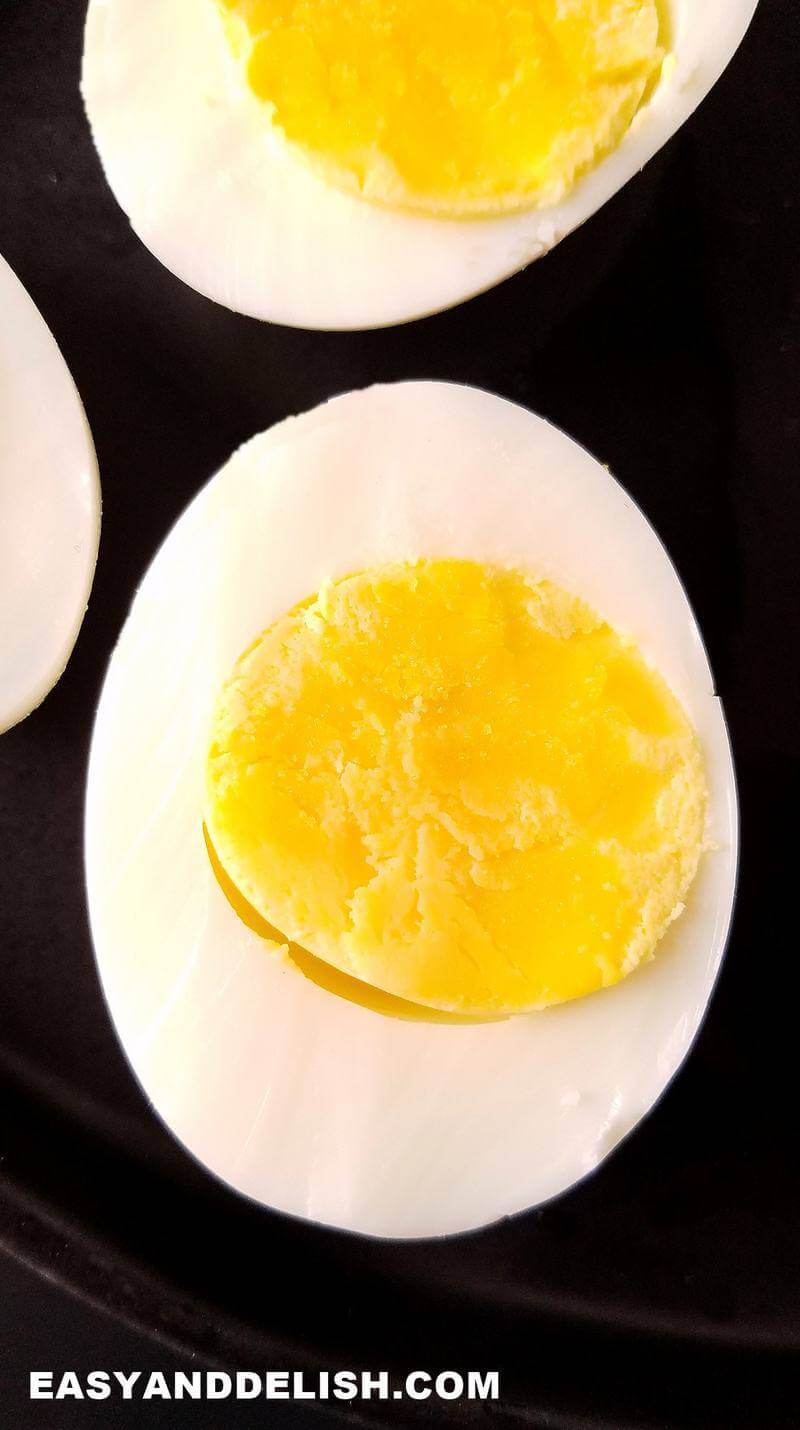
How to prevent your eggs from cracking
There are several ways to prevent eggs from cracking:
- Place cold eggs (straight from the fridge) in cold water. Putting them in boiling water will make them crack due to temperature shock! To prevent cracking, place eggs in cold water and then turn on the heat.
- Add vinegar to the water. The acidity will help to congeal the egg white, stopping the leak.
Easter Eggs
If you are planning to make hard cook eggs for Easter and peel them easily, buy eggs that are 1-2 weeks old and stir in vinegar in the water.
This will not only prevent cracking but also will soften the shell, making it easier to peel.
In addition, after they have cooled in an ice bath, make sure to roll them on the counter to crack them all around and then soak in water for a while. This will make them even easier to peel.
If you live at a high altitude, it will take more time to cook them.
Other Egg Recipes To Try·
- Healthy Veggie Egg Bake Casserole
- Sweet Berry Cloud Eggs
- Curried Pumpkin Deviled Eggs
- Pizza a Portuguesa
- Coconut Noodle Soup
- Starbucks egg bites
- Breakfast egg cups
- Steak and eggs
- Quindim
PIN & ENJOY!
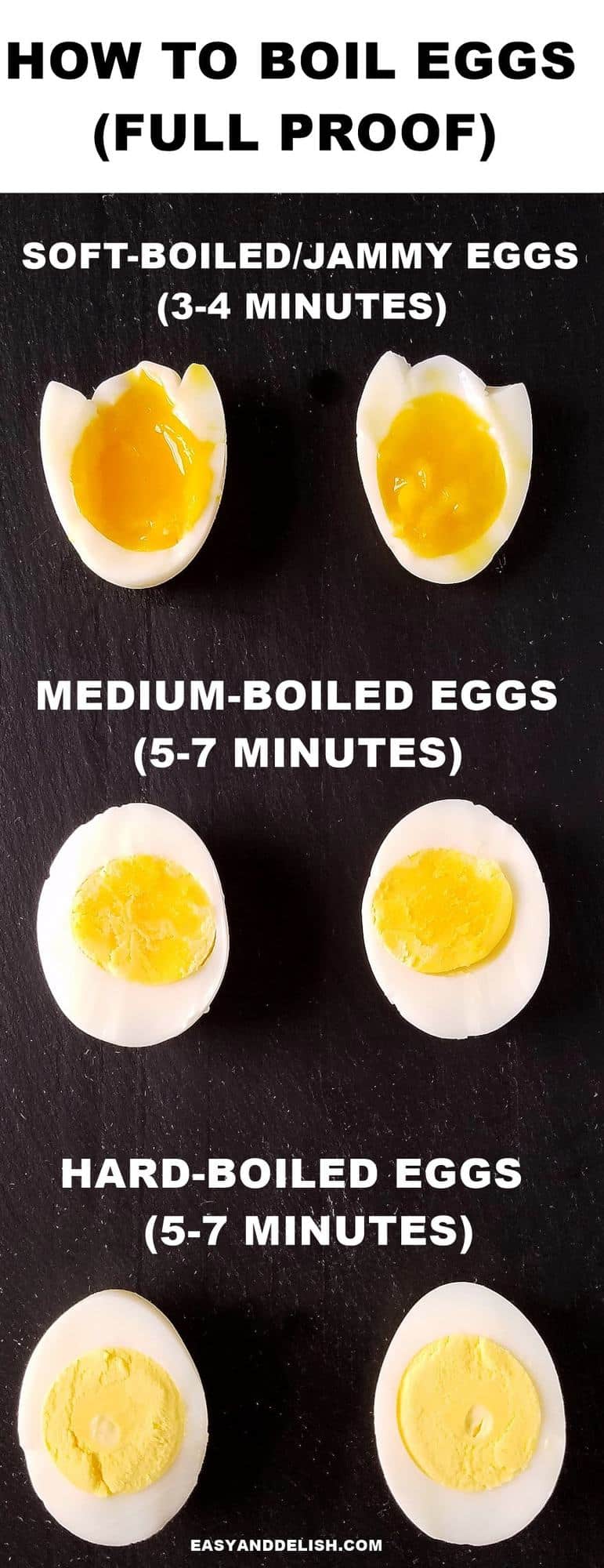
How to Hard Boil Eggs Properly
Equipment
- stovetop
- pan
Ingredients
- 4 eggs
- 1 teaspoon vinegar
Instructions
- Place (2 weeks or older) eggs in a saucepan and then cover them with cold water by 1inch. Stir in vinegar.
- Bring water to a boil over high heat. As soon as it comes to a full rolling boil, remove pan from heat and cover with a lid.
- Let stand off the heat for 3-4 minutes (soft-boiled eggs), 5-7 minutes (medium-boiled eggs), or for 10-12minutes (hard-boiled eggs). If you are a stickler for avoiding overcooking, then cook eggs for the minimum time stated within those ranges.
- Drain and transfer eggs to a large bowl with iced cold water and let them sit for up to 1 minute. Roll eggs on the counter (or shake them very well in a closed jar) to crack and then peel under running water.
Recipe Notes
- In order to not clog up the sink's pipes with eggshells, peel eggs under running water but with a colander placed underneath, so that the shells will fall into the colander. For extra safety, cover the sink drain with its drain stopper, just in case any tiny pieces of shell pass through the colander.
- If the egg sinks (lying on its side), it is a fresh egg. It is great to eat but hard to peel. Fresh eggs have a brighter yellow yolk when cooked.
- If the egg sinks but stays upright on one end, it is an older egg that still good to eat. It will be easy to peel!
- If the egg floats, it’s an expired egg. Don’t eat it!
- Use older eggs (1 week or older). What this means is fresh eggs will be hard to peel because they contain a thin membrane under the shell!
- Add either ½ teaspoon salt or baking soda to the water to make eggs even easier to peel. The baking soda particularly increases the alkalinity of the water, making easy to peel eggs.
- Add vinegar to the water, which serves a double purpose: not only does it help prevent eggs from cracking but also softens the shell, making it easier to peel. I add it every time that I hard boil eggs!
- Roll hard boiled eggs on the counter. After cooking and cooling them in a bowl of ice cold water, roll eggs on the counter to crack them all around. Then either place them under running water or soak them in water to loosen the shell and peel it easily.
- Place cold eggs (straight from the fridge) in cold water. Cold eggs in boiling water will make them crack due to temperature shock! To prevent cracking, place eggs in cold water and then turn on the heat.
- Add vinegar to the water. The acidity will help to congeal the egg white, stopping the leak.
- Place eggs in a large saucepan. Cover them with cool water by 1 to 2 inches.
- Cover the pot with a lid and bring water to a boil over high heat.
- As soon as the water reaches a full rolling boil, set the timer for the desired time.
- For soft-boiled eggs, boil eggs for 2-3 minutes
- For medium-boiled eggs, boil eggs for 5-6 minutes
- For hard-boiled eggs, boil eggs for 7-8 minutes
- Using a slotted spoon, transfer cooked eggs to a large bowl with ice cold water and let them sit for 2-3 minutes. Roll eggs on the counter to crack and then peel under running water.
- Bring eggs to room temperature by placing them in a bowl of warm water for 5 minutes, or by letting them sit out of the fridge for 1 hour before cooking. If you don’t let them come to room temp, they will crack!
- Meanwhile, boil water over high heat. Then, using a slotted spoon gently place eggs in the boiling water. Reduce heat to medium-low and let water come to a simmer.
- Simmer (do not boil) for the required time:
- Soft cooked: 3-4 minutes
- Medium cooked: 5-7 minutes
- Hard cooked: 12-15 minutes.
- Cool in an ice water bath to stop the cooking. Crack the shell by rolling on the counter and peel under running water to help loosen shell. NOTE: Exact cooking time depends on the temperature of eggs, size of eggs, and amount of water used.
Nutrition
** Nutrition labels on easyanddelish.com are for educational purposes only. This info is provided as a courtesy and is only an estimate, since the nutrition content of recipes can vary based on ingredient brand or source, portion sizes, recipe changes/variations, and other factors. We suggest making your own calculations using your preferred calculator, based on which ingredients you use, or consulting with a registered dietitian to determine nutritional values more precisely.
Please note that health-focused and diet information provided on easyanddelish.com is for educational purposes and does not constitute medical advice, nor is it intended to diagnose, treat, cure, or prevent disease. Consult with your doctor or other qualified health professional prior to initiating any significant change in your diet or exercise regimen, or for any other issue necessitating medical advice.
Article was first published on April 3rd, 2013.



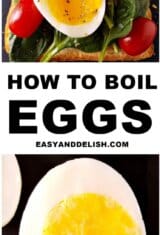
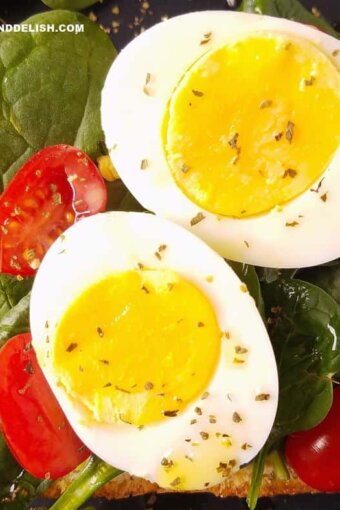
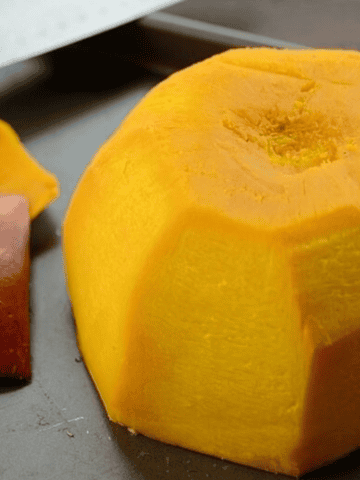
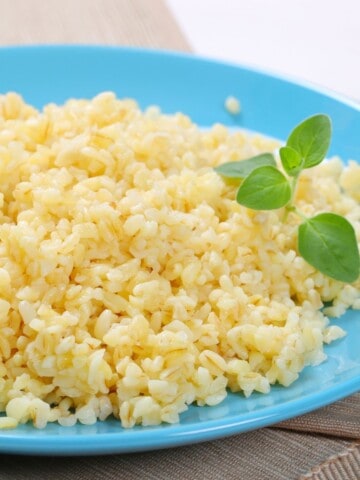
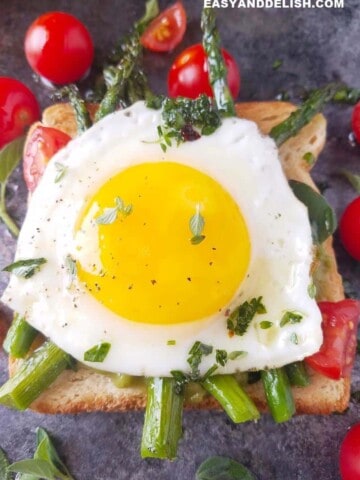

Raymund says
Great tips! Certainly helpful. I like mine between soft and medium boiled.
Ghulam Mohyudin says
Good to know those hard boiled egg tips work too! I learn so much from you as well! Keep it up great post.
Josiah - DIY Thrill says
These are some great tips!
Denise Browning says
Thanks a lot. Hard boiled eggs are a staple at my household.
Nancy H. says
Hi, Denise! I made these hard boiled eggs following your recipe and they came up perfect. I made a big batch and refrigerated to have them for snack and also in salads and sandwiches.
Denise Browning says
Hi, Nancy! Thanks for using our method. When followed correctly, our boiled eggs always come out right -- with a creamy yolk and nice, set whites. Enjoy!
Ann morris says
Great tips...tax’s.for the forethought...ann
Sheri says
Thank you so much for sharing useful tips on how to hard boil eggs properly. It helped me a lot!
Amira says
Great tips, I usually boil eggs but unfortunately at least one must come out cracked 🙁 will try your methos next time. Thanks
Denise Browning says
Thank you, Amira, for stopping by. I hope this method helps you to avoid cracked eggs.
Kate@Diethood says
Every culinary person I have met always discusses the importance of cooking eggs properly. 😀 I'm so glad to have you all in my life... why pay the big bucks to a culinary school when I have all of you to teach me!! Thank you for sharing your insights, Denise!!!
Denise Browning says
Thank you, Kate! I am glad to share with y'all what I have learned both at culinary school and work so far...
Nami | Just One Cookbook says
Perfectly cooked hard boiled eggs Denise! I like your egg stand too!
Denise Browning says
Thanks, Nami! I bought this egg stand at World Market -- one of my fav stores!!! 🙂
Maureen | Orgasmic Chef says
That's how I've cooked eggs for years but my times were different and I didn't take small eggs into account. I shall change my ways!
Denise Browning says
Yep, the size of the eggs really matter -- and so the cooking time will vary depending on their size...
Jen L | Tartine and Apron Strings says
This is an invaluable lesson in what seems like a simple thing to do, but really something hard to master! Thanks for sharing all your tips and tricks. There's just something about the simplicity of eggs that capture the imagination. I learned in art class a long time ago, to draw an egg on my first lesson. Seems simple, but takes time to master!
Denise Browning says
Thanks, Jen, for your comment! I so agree with you. I have learned underestimate nothing. Sometimes what it seems so simple, it's not that simple as I and many people can think. There is always something that can be learned or improved. Hard-boiling an egg properly is definetely one of those things.
Liz says
Your blog post is a wonderful resource! I rarely boil eggs, but this is basically my method. Thanks!!!
Denise Browning says
Thanks, Liz! Glad to know...
Deb says
What a great post! Loaded with practical information that we all can use in the kitchen. My mom always let the eggs sit in the water for 20 minutes, which is too long!
Denise Browning says
Is that right, Deb? There were a few times that I overcooked my eggs and ended up with rubbery, greenish hard-boiled eggs as well. I never knew why this ended up happening until I learned how to boil them properly.
Lail | With A Spin says
Never knew about all these details, Denise. Thank you for sharing the tips. Very helpful.
Denise Browning says
Thanks, Lail! These tips will certainly avoid problematic hard-boiled eggs. 🙂
Sugaretal says
Very handy tips Denise. Never paid attention to all these details and ended up quite a few times with not so great eggs. Thank you for sharing! Great pictures too:-)
Denise Browning says
Thanks, Sonali! Before learning all these tips, I also ended up with problematic hard-boiled eggs a few times-- mostly greenish. 🙂
But after learning why, I had problems no more.
Coffee and Crumpets says
Great "how to" Denise! I've been using the baking soda technique lately and have had no problems peeling them. I used to struggle before!
Very helpful!
Nazneen
Denise Browning says
Thanks, Nazneen! Yes, the baking soda really help to have freshly laid eggs peeled easier. It increases their PH making the peeling not a problem anymore.
Juliana says
Pizza a Pourtuguesa...yum! Haven't these for a while...and I do not like the rubbery eggs...thanks for the tips Denise.
Hope you had a great Easter and are enjoying your week 🙂
Denise Browning says
Thanks so much, Juliana! I hope you have the chance to make it and enjoy pizza à Portuguesa again.
Mi Vida en un Dulce says
Yeah....that's the point, how to boil eggs and have yellow yolks instead of green ones.
Excellent tips Denise...!!!
Denise Browning says
Thanks, Nydia! I am thrilled that you have found all those tips to be useful.